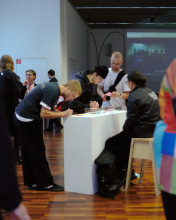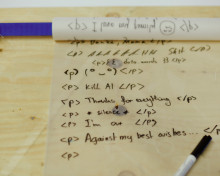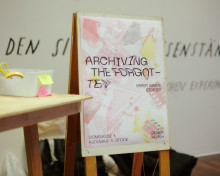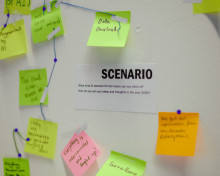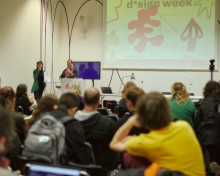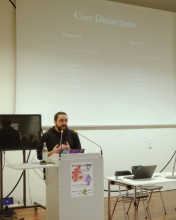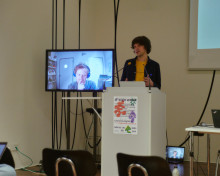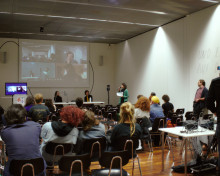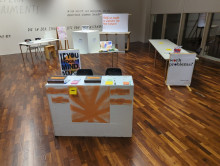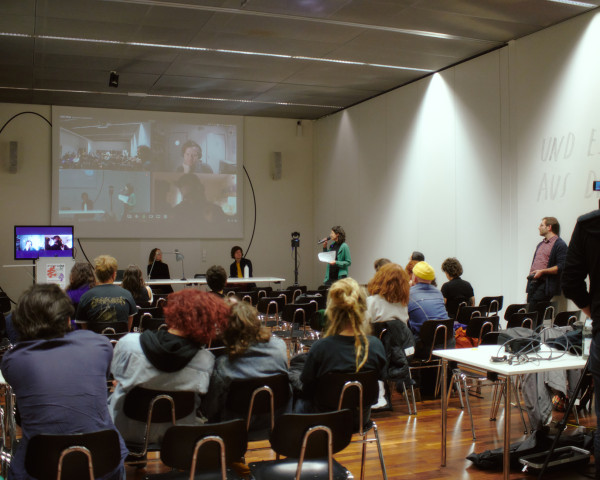
Opening Dsign Symposium
with:
Carlo Milani – Convivial Technologies
Onur Olgaç – Emancipation 101 for designers: can design be apolitical?
Helena Schmidt – Finding Tools
Joseph Knierzinger & Simon Repp – «To change the rules, change the tools?»
Lucile Haute – Using web tools for print graphic design
Silvio Lorusso – What Design Can’t Do: On Semi-Automation and Cultural Professionalism
d*sign week 2023 Symposium Pt. 1 (Carlo Milani, Onur Olgaç, Helena Schmidt)
d*sign week 2023 Symposium Pt. 2 (Joseph Knierzinger & Simon Repp, Lucile Haute, Silvio Lorusso)
Program Details
Convivial Technologies — Carlo Milani
Smartphone? Social media? Cutting-edge technologies? AI? It’s up to you, common sense says. YOU can use them well or badly.
This narrative depicts humans as absolutely free subjects who make well-considered choices to maximise their utility, employing tools to achieve their ends. But machines are not all the same, indeed, each has its own specific characteristics - affordances that favour some uses over others. Mass digital systems, developed by global corporations, favour toxic interactions based on the self-abuse of the human dopaminergic system. Nudging and gamification make them even less neutral.
The technologies we live with reveal much about the way we humans treat ourselves and the world, confronting us with our contradictions. Every choice is relevant, every deviation from the norm can give rise to a different evolution, towards convivial technologies.
Carlo Milani
Carlo Milani (PhD) aims to reduce technical alienation by translating and writing essays - spiced with hacker attitude. Alongside his publishing, teaching and research activities, Carlo works as a computer scientist with alekos.net to develop appropriate information technologies. Under the Ippolita heteronym he published, until 2018, various essays including Open is not free (2005), The dark side of Google (2007), In the Facebook Aquarium (2012). He currently holds lectures and training courses based on hacker pedagogy with C.I.R.C.E. (International Research Centre for Electric Conviviality - circex.org). His last book is Convivial Technologies (2022). For warmth, he goes into the woods for wood.
Emancipation 101 for designers: can design be apolitical?
— Onur Olgaç
Free and open source software have an infamous reputation for being unaccommodating, or even in extreme cases straight up unusable. While there is still some truth in this overgeneralization, open source -alongside Linux- has come a long way from its clumsy early-days of arguably failing to keep up with modern computing needs for the end user.
Considering further specific needs in place, design tools can be seen as an additional layer to the challenge of providing alternatives to proprietary workflows. With inconceivable amounts of marketing and R&D budgets, tech companies made sure to dominate the world of design on how its technical needs -which get passed on as responsibilities to the designer- continue developing in their tightly kept environment.
From licenses to advertising schemes, the talk will focus on the ways certain narratives surrounding tooling are kept in place within the design world, and try to shed light on the true price of “technical industry standards” in design.
Onur Olgaç
A system architect, sysadmin, and lecturer at present, Onur Olgaç works as a consultant and AI systems maintainer in the Linux ecosystem for secure & scalable open-source infrastructure.
With a BSc. in Computer Science and an MA degree from Interface Cultures, his research on the politics surrounding technology within artistic contexts lead to the development of his teaching series “Digital Sovereignty” that aims for the emancipation of the end user.
He is currently lecturer and co-curator for the “Human Rights in the Digital Age” cluster within the Applied Human Rights MA program at the University of Applied Arts Vienna, and also teaches at the Interface Cultures MA program in the University of Arts Linz.
Finding Tools, Working on Ideas.
Introducing Digital Didactics in Art Education (didae.eu)
— Helena Schmidt
The lecture will present the website didae.eu, which is the result of the international Erasmus+ research project “Digital Didactics in Art Education” (2021-2023). The OER platform provides an overview on easily accessible digital tools for art making and design. This includes digital tools for drawing, painting, sculpting, animation, augmented reality, video, photography, gaming and game development, graphic design, photo editing and photo manipulation, instructions for these tools and classroom assignments (“ideas”). The presentation provides insight into the criteria for the selection of the project’s tools and connected work assignments. The best-practice tools and ideas represent a radically new approach to critical, emancipatory, intersectional, contemporary post-pandemic didactics of digitality in art education in relation to local and international policies.
Helena Schmidt
Dr. Helena Schmidt is an art scholar and art mediator in theory and practice. She works as a post-doc at the Academy of Fine Arts Vienna where she completed her doctorate on the image concept of so-called “poor images” (according to Hito Steyerl) under the supervision of Prof. Elke Krasny. Her dissertation was awarded the honorary award for scientific works 2022/23 by the Academy of Fine Arts Vienna. Helena Schmidt also teaches at the Bern University of the Arts where she worked until 2019 at the Institute for Art Education. From 2020-2022 she was co-head of mediation at Vienna Design Week. Main fields of interest: Digital imagery, critical art and design education, poor image art education (helenaschmidt.com).
«To change the rules, change the tools?»
— Joseph Knierzinger & Simon Repp
The title of this talk goes back to an aphorism by Lee Felsenstein, an advocate of Ivan Illich’s “Tools for Conviviality” and early pioneer of the homecomputer, however we allowed ourselves to add a questionmark. Why? Over the last decade, proprietary software used in art education shifted from lifelong licensing to a “Software-as-a-Service” model, forcing students, institutions and their alumnis to rent their tools, for ever increasing prices, on a monthly basis instead of actually ever owning (or cracking) them. Although this development was reflected in art/design education institutions and there are various alternative, counter-cultural DIY and FLOSS approaches, this reflection never lead to structural changes and the dependency on proprietary tools (actually products) was never broken. What went wrong and where do curent strategies to structurally address the problems fall short?
Joseph Knierzinger
Joseph Knierzinger is design/art prototyping teacher in Rotterdam and art/crafts edcuation student in Vienna. He regularly takes devices and tools apart to create anachronistic, fictitious timelines. He loves to take long hikes with a document scanner to capture the details of the world.
joak.nospace.at
Simon Repp
Developer and designer with a focus on ethics, simplicity and sustainability.
simonrepp.com
@freebliss@post.lurk.org
Using web tools for print graphic design
— Lucile Haute
Graphic designers are facing the hegemony of a commercial software suite. Alternative processes are developed, such as the use of web techniques (html and css languages) to produce from the browser a pdf file for printing. It’s named web-to-print or css print. On the one hand, the convergence of print and screen workflows is a major challenge for publishers joining an invisible revolution for the graphic design profession. On the other hand, artists, graphic designers and collectives find in the reappropriation of their graphic creation tools a political commitment participating in a technological emancipation and empowerment. They embrace the values of free and open-source software, defending an ethic and developing a singular aesthetic. With this in mind, over the past few years, practitioners and teachers at various institutions have integrated web-to-print practice into their graphic design courses. This presentation will cover some of these workshops.
Lucile Haute
Lucile Olympe Haute is an artist, researcher and educator. Her research brings together spirituality, technologies and politics — understood in the broader sense of a committed and eco-responsible «living together» that goes beyond anthropocentrism and includes kingdoms of plants, animals and fungi, even the communities of bacteria in our biotopes. She combined these issues within her essay the Cyberwitches Manifesto, bringing together witches from different backgrounds, politically committed (such as ecofeminism, queer/transfeminism, technological emancipation) and involved into empowerment processes. She studied and made digital, multisupport and hybrid art books, addressing their sustainability. She uses and teaches css-print technics. She is the founder of the Web To Print Collection <web.2print.org>. She is a lecturer in art & design at the University of Nîmes (FR) and an associate researcher at École des arts décoratifs Paris (FR).
lucilehaute.fr
What Design Can’t Do: On Semi-Automation and Cultural Professionalism
— Silvio Lorusso
Guilt, fear, loss, ambition. Our relationship with technology is not just an operational one, but it’s linked to a whole spectrum of sentiments: designers worry and get excited, they mourn the demise of a technique, and they celebrate the birth of new know-hows. The territory is murky and not without risks, such as that of deskilling, that is, the relative contraction and devaluation of specific skills. Here, the case of graphic design is emblematic: outside design circles, the graphic designer is considered a sort of technician who possesses a certain adroitness with desktop publishing applications. This perception determines the social value of the designer as a professional figure, and to some extent also their compensation. As happened with the service sector as a whole, some skills – some trades, even! – have been incorporated into general-purpose software.
Silvio Lorusso
Silvio Lorusso is a writer, artist and designer based in Lisbon, Portugal. In 2018, he published his first book entitled Entreprecariat. He is assistant professor and co-director of the Center for Other Worlds at the Lusófona University in Lisbon and a tutor at the Information Design department of Design Academy Eindhoven. Lorusso holds a Ph.D. in Design Sciences from the Iuav University of Venice.
silviolorusso.com
Workshop/Installation
Exploration into the Open: Transforming the Design Process
participatory workshop with Visual Communication Students
@/ Kunstuniversität Linz, Audimax, 1.floor
Domgasse 1, 4020 Linz
From a Post-humanist perspective, it’s not only the designer or other humans influencing our creative outcomes. Different tools, materials, contexts, and design processes affect how somebody experiences our things. In a participatory workshop setting, you can open up and reflect on your design practice together with students from the Master’s program Visual Communication. We share our experience and design practices in workflow, archiving information, mind mapping, searching and managing inspiration, different visual translations into the digital space, and speculate about new tools for designers.
Natalia Chaykina, Marcel-Nikodem Dziewulski, Eliana Fonseca Rodrigues, Lina Gamler, Ana Teresa Goncalves Dias Zerbes, Ann-Kathrin Häupl, Anika Sophie Haider, Chieh Lu, Katarina Matić, Sheida Mohammadi, Marie Pfaffl, Rehab Saad Abdelghafar Abdelfatah Hasanen, Eva Werner
supervised by Marianne Lechner, Davide Bevilacqua, Barbara v. Rechbach

